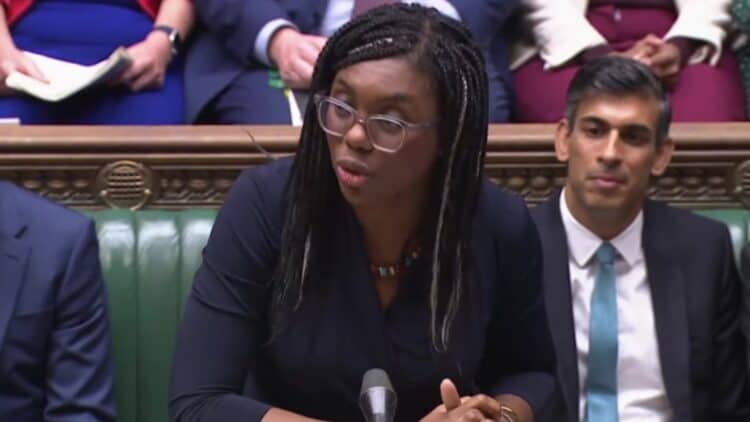Conservative leadership candidate Kemi Badenoch has sparked controversy after claiming she “became working class” following a brief stint working at McDonald’s as a teenager. Badenoch, who grew up in a middle-class family, made the remarks during an interview as part of her campaign to succeed as the next leader of the Conservative Party.
Badenoch, the MP for Saffron Walden in Essex, shared her experience of working at the fast food chain at age 16, suggesting that the job altered her class identity. “I grew up in a middle-class family, but I became working class when I was 16 working in McDonald’s,” she said during an appearance on Chopper’s Political Podcast.
Her comments, seen by many as an attempt to connect with working-class Tory voters, were met with widespread criticism and mockery on social media. Labour MP Chris Bryant was among those quick to respond, questioning Badenoch’s understanding of class identity. Sharing a clip of her remarks on X (formerly known as Twitter), Bryant wrote: “I’m not sure that’s how it works.”
Social Media Mockery
Badenoch’s comments sparked a flurry of reactions online, with many people mocking her for seemingly misunderstanding what it means to be working class. One user sarcastically wrote: “Yeah right. ‘And as I was sweeping floors in the McDonald’s toilets I used to sing “My Old Man’s a Dustman” and randomly mutter “GORBLIMEY GUV!” before I eventually remembered that I was the upper-middle class daughter of a professor and a doctor.'”
Another user humorously asked: “The reverse of social climbing. Is there a term for it?”
The social media backlash highlights the broader debate about class identity in British politics, where the ability of politicians to relate to working-class voters is often scrutinised. Badenoch’s comments have raised questions about whether a brief stint in a minimum wage job can change someone’s social class, particularly for someone who, by her own admission, grew up in a middle-class household.
A Controversial Figure
This is not the first time Badenoch has made headlines for provocative remarks. In 2018, she admitted to hacking into the Labour Party’s website in what she described as a prank. When asked about the “naughtiest” thing she had ever done, Badenoch said: “Ten years ago I hacked into a Labour MP’s website and I changed all the stuff in there to say nice things about Tories.”
The admission, which was met with a mixture of disbelief and humour, added to her growing reputation as a divisive figure in British politics. While some applaud her outspoken nature and willingness to challenge political norms, others view her remarks as tone-deaf or out of touch.
Leadership Bid Amid Controversy
Badenoch’s comments come at a crucial time in her leadership bid. As one of the four remaining Conservative hopefuls, she faces a tough battle to win over party members. Currently trailing behind frontrunner Robert Jenrick, Badenoch is seeking to position herself as the candidate who can appeal to both the Conservative base and working-class voters.
During her interview on Chopper’s Political Podcast, Badenoch also emphasised her careful approach to public statements, claiming that she rarely makes gaffes or needs to apologise for her words. “I never have to clarify, because I think very carefully about what I say,” she stated.
However, the backlash to her McDonald’s remarks suggests that many voters may disagree. Critics have argued that her attempt to appear relatable to working-class voters was both ill-conceived and poorly executed.
Class in British Politics
Badenoch’s comments have reignited discussions about class in British politics, particularly among the Conservative Party, which has traditionally struggled to connect with working-class voters. Many feel that politicians like Badenoch, who come from privileged backgrounds, often try too hard to appear relatable to voters who face everyday financial struggles.
For some, Badenoch’s attempt to claim a working-class identity due to her experience at McDonald’s seemed insincere, especially given her upbringing in a middle-class family. Others pointed out that a short period of employment in a minimum-wage job does not equate to the systemic and often generational challenges that many working-class families face.
Despite the criticism, Badenoch has continued to defend her position, arguing that her experience working at McDonald’s helped shape her understanding of the challenges faced by those in lower-paying jobs. “It gave me a new perspective,” she said, while adding that it was a valuable experience in her personal development.
Looking Ahead
With the Conservative Party leadership race nearing its conclusion, Badenoch’s ability to navigate these controversies will be crucial to her chances of success. As the party prepares for its annual conference on September 29, the remaining candidates—Robert Jenrick, Tom Tugendhat, and James Cleverly—will be making their final pitches to Conservative members.
While Badenoch’s remarks have garnered attention, it remains to be seen whether they will help or hinder her campaign. What is clear, however, is that class remains a deeply divisive issue in British politics, and any attempts by politicians to claim solidarity with the working class will be closely scrutinised.
For now, Kemi Badenoch’s journey from McDonald’s worker to Conservative leadership hopeful continues to generate discussion—but not necessarily the kind she was hoping for.
You may also like: Sex Education actor left injured after alleged police assault in Fulham







